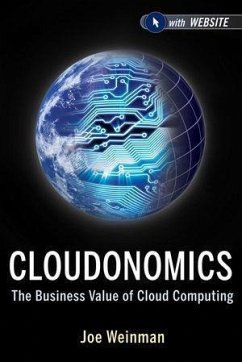
Cloudonomics (eBook, ePUB)
The Business Value of Cloud Computing
Versandkostenfrei!
Sofort per Download lieferbar
38,99 €
inkl. MwSt.
Weitere Ausgaben:

PAYBACK Punkte
0 °P sammeln!
The ultimate guide to assessing and exploiting the customer value and revenue potential of the Cloud A new business model is sweeping the world--the Cloud. And, as with any new technology, there is a great deal of fear, uncertainty, and doubt surrounding cloud computing. Cloudonomics radically upends the conventional wisdom, clearly explains the underlying principles and illustrates through understandable examples how Cloud computing can create compelling value--whether you are a customer, a provider, a strategist, or an investor. Cloudonomics covers everything you need to consider for the del...
The ultimate guide to assessing and exploiting the customer value and revenue potential of the Cloud A new business model is sweeping the world--the Cloud. And, as with any new technology, there is a great deal of fear, uncertainty, and doubt surrounding cloud computing. Cloudonomics radically upends the conventional wisdom, clearly explains the underlying principles and illustrates through understandable examples how Cloud computing can create compelling value--whether you are a customer, a provider, a strategist, or an investor. Cloudonomics covers everything you need to consider for the delivery of business solutions, opportunities, and customer satisfaction through the Cloud, so you can understand it--and put it to work for your business. Cloudonomics also delivers insight into when to avoid the cloud, and why. * Quantifies how customers, users, and cloud providers can collaborate to create win-wins * Reveals how to use the Laws of Cloudonomics to define strategy and guide implementation * Explains the probable evolution of cloud businesses and ecosystems * Demolishes the conventional wisdom on cloud usage, IT spend, community clouds, and the enterprise-provider cloud balance Whether you're ready for it or not, Cloud computing is here to stay. Cloudonomics provides deep insights into the business value of the Cloud for executives, practitioners, and strategists in virtually any industry--not just technology executives but also those in the marketing, operations, economics, venture capital, and financial fields.
Dieser Download kann aus rechtlichen Gründen nur mit Rechnungsadresse in A, B, BG, CY, CZ, D, DK, EW, E, FIN, F, GR, HR, H, IRL, I, LT, L, LR, M, NL, PL, P, R, S, SLO, SK ausgeliefert werden.












